The Official Rambling Fox Top 10 of 2014
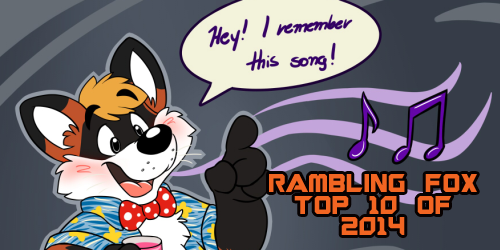
So here we are . The top ten albums of 2014, carefully listened for countless amounts of times and then placed in order of what made the most impression. As always, personal bias is heavily at play here and I’m not even trying to make a stab at any sort of objective measures. That would be stupid.
2014 was a good year. It wasn’t a great year, but out of the nearly endless list of albums released during the year only a couple were actual disappointments – the rest varied somewhere between brilliant and rather good, with most leaning closer to the latter. Ranking the albums this year wasn’t really a difficult task: this year’s peaks showed their nature pretty clearly early on and separated pretty obviously from the mountains of enjoyable, but not as enjoyable albums that came out alongside them. Overall it’s not a year that’s going to be remembered strongly in the grand scheme of things, but it did produce a fair amount of surprising comebacks and excellent appearances from a good number of sources I wouldn’t have expected to be listening to before.
But here we go. The ten.
The present and future of Rambling Fox
Hello everyone, the few bold and fair who actually follow this blog.
As you may see, I’ve been away for a while – almost a year, in fact. I apologise for the lack of posts and especially for any lack of explanation as to why that is. So, in case you feel like I owe you one, here’s the short version why: 2013 burned me out from music writing. I tried making music writing a Serious Thing in 2013: I tried to keep Rambling Fox steadily updated with both news, reviews and articles while trying to craft an identity for it, while at the same time I joined a professional music site for a while as a reviewer to make myself a point. And with all that, I did understand a few things. One, trying to adhere to any strict schedules when it comes to a casual hobby site is not only hard to do when you have so much else going on in your life, but also defeats the whole fun aspect of it. Two, writing about new music as it comes out might be great for some but not for me. Rambling Fox has always been pretty late when it comes to new releases and that’s because I heartily believe in the power of letting music get to you. In order to fully understand and appreciate a release, it needs to spend time with you and it needs to go through the test of time. With brand new music, you don’t get that and all you get are ultimately superficial reflex reactions that are bound to be outdated a month down the line and even moreso after that. I genuinely struggled staying up to date and writing about music as it was released.
At the end of 2013 writing about music had become a chore and I intended to take a small break from it. That break became a year long. Whoops. In the meantime, I’ve greatly enjoyed listening to new music once more without constantly thinking about what to write about it straightaway, stressing about blog update speed, etc. I’ve been able to just listen, love and analyse in my head without having the need to make up my mind “officially” about it. I had no rush to go back to Rambling Fox and eventually it vanished away from my mind completely.
In the past few months I’ve started getting excited about music writing again. I love music and I love nerding out about it, and writing about it is something I genuinely love doing. But trying to go about it like I have done in the past with all the blogs I’ve been involved with just doesn’t cut it. However, I have other ideas. I’ve recently started to design a yet another new blog but this time with an entirely different premise, one that more accurately matches how I want to write about music and one that’s different enough that converting Rambling Fox into it just wouldn’t work. I don’t want to overburden myself with sites either. Hence, Rambling Fox is going to go.
I’m going to do one more proper update on this blog, a yearly top 10 list of 2014’s best albums. It’s an appropriate way to close off the site for the time being and it also allows anyone who cares to find out what I actually appreciated in 2014. After that, RF will fall into slumber and I will slowly begin working on my next adventure, which I will link to once the time is appropriate.
I genuinely have no idea how many people follow this, if any, but if you do then thank you so much for caring.
The top 10 of 2014 list will be out sometime before Christmas. Stay tuned!
The Official Rambling Fox Top 10 of 2013
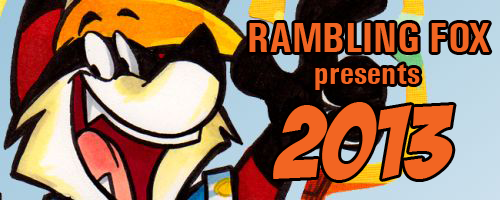
The time of lists is upon us once more. Judging our past years in music, spending time thinking things that probably distract us from the music in a fashion that’s not particularly good, ranking things for our own perverse pleasures. Top 10 lists are wonderful.
2013 was a good year. It’s been very much a standard kind of year – a pretty good 6-8/10 average standard throughout, with a few major disappointments and a handful of albums of such notable quality that they’ll continue to be the reason 2013 is remembered for ages to come, the kind of batting average that tends to characterise most years. There were a few notable trends both universal and personal: in the former category the tendency of a number of artists releasing albums in quick succession to the their previous ones, in the latter category the growing influence of pop music in my listening habits to add some rediscovered colour to my usual habits. There’s been no overaching trends that would give 2013 a particular theme however, and thus there’s little really to discuss about the past musical year in terms of anything but the actual music itself.
Therefore, to waste no further time – presented here are this year’s 10 best albums, as judged by yours truly.
As the season switches to autumn and we all start digging out our comforting rainy day albums, our protagonist reminisces on an album full of soothing warmth, gentle acoustic picking and gorgeous harmonies from a band who, for one album, discovered how to write great songs. And apologies for the lateness in the delivery of this, PC problems caused some delays.

I lose some sales
And my boss won’t be happy
But I can’t stop listening to the sound
Of two soft voices blended in perfection
From the reels of this record that I found
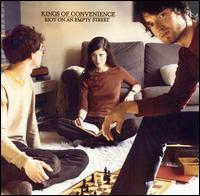 That lyrical excerpt from “Homesick”, Riot on an Empty Street‘s opening track, nails down why its parent album is such a lovely listen; emphasis on the word “lovely”. The backbone and foundation of Riot on an Empty Street are two harmonious voices on top of gently strummed and picked acoustic guitars and the occasional other instruments. The obvious comparison point are messieurs Simon & Garfunkel but the legendary singer/songwriter duo always had some big ambitions and ideas; the good gentlemen Erlend Øye and Eirik Glambek Bøe on the other hand rarely stretch beyond the charms of being bedroom musicians. The atmosphere and intimacy of Riot on an Empty Street are more reminiscent of a private get-together in a private cabin than any world-conquering songwriter parades. It’s simply two men playing guitar and singing with enough warmth to replace the fireplace that’s surely crackling somewhere in the corner.
That lyrical excerpt from “Homesick”, Riot on an Empty Street‘s opening track, nails down why its parent album is such a lovely listen; emphasis on the word “lovely”. The backbone and foundation of Riot on an Empty Street are two harmonious voices on top of gently strummed and picked acoustic guitars and the occasional other instruments. The obvious comparison point are messieurs Simon & Garfunkel but the legendary singer/songwriter duo always had some big ambitions and ideas; the good gentlemen Erlend Øye and Eirik Glambek Bøe on the other hand rarely stretch beyond the charms of being bedroom musicians. The atmosphere and intimacy of Riot on an Empty Street are more reminiscent of a private get-together in a private cabin than any world-conquering songwriter parades. It’s simply two men playing guitar and singing with enough warmth to replace the fireplace that’s surely crackling somewhere in the corner.
There are two other Kings of Convenience albums. The debut, Quiet Is the New Loud, is a bit of a green, wet-behind-the-ears kind of deal and an archetypical example of the pitfalls many acoustic singer/songwriters fall in, being a largely pleasant listen but with no actual meat into it. 2009’s Declaration of Dependence on the other hand saw the duo reunite after a long break of various side projects and explorations towards different styles, coming together to create a bunch of acoustic filler that neither of them really were in the mood for anymore. Riot hits that sweet spot where its creators are still excited about what they’re creating, whose skills have now refined to really make good of the path they’ve chosen and whose interest in new ways to do things results in fleshing out the songs in a manner that only does good for them.
Homesick
While its basis is very much on the simple and minimal, Riot never feels monotonous because here and there it likes to shake things up a little. A rhythm section appears in a few tracks and actually plays its role in an interesting enough matter that they take charge of the song positively. Feist lends her vocals on a few tracks, further solidifying her status as an A-class guest featurer. “Know-How” brings both of those together to an absolute delight. “Gold in the Air of Summer” has a horn section to die for and the piano/horn-driven bridge is an emotional journey and a triumph of arrangement. The biggest departure is “I’d Rather Dance with You” – an adorably twee, ridiculously singalongable and charmingly bouncy full-on indie pop number that comes out of nowhere and makes the world a brighter place for the little over three minutes it goes on. When things are kept simple, it’s still incredibly effective: “Homesick” and “Surprise Ice” in particular are exactly the sort of thing you’d desire to hear from a record like this, the former a soothing welcome and the latter a heart-trembling slice of desolate beauty.
There’s no misses among the twelve tracks and each one is genuinely delightful in one way or another (and I mean this in a way that they do bring a smile on one’s face), but Riot on an Empty Street’s greatest quality is how comforting it is. The production is just right to bring the warmth of acoustic instruments to the forefront and the vocals are a great example of doing a lot with little. Øye, the lead singer of the two, has a voice that doesn’t have a particularly far range or great evocative depths, but his tone is that of a friend you could know in real life and that’s what makes it work. His soft huskiness sounds as soothing as the instruments and when the album lays a song upon song of these wonderfully calm, beautiful little acoustic pieces the overall effect is a serene, peaceful one. That you can tap your foot along to the tunes and hum their melodies for days is a bonus.
If there’s a perfect time to listen to the album, it’s right now in the autumn – a rainy day outside, something warm in a cup in your hands, music gently filling the warm indoors. It’s music made exactly for those precious little cliché-like moments in life when the world seems to have calmed down and everything is just fine for a while.
I’d Rather Dance with You

Or why Manic Street Preachers‘ eleventh studio album is a sign of a new lease on the band’s life and a new, fruitful chapter that finally fills some of the promises they’ve been making over the past few years.
Even as a self-admitted and highly biased super fan, I don’t think it’s a particularly damning or untruthful thing to say that the Manic Street Preachers have been coasting on past glories for over half a decade now. For a long time one of their defining stylistic trademarks was that they always reacted very bluntly to whatever they had done before: most of their albums can be seen as strong reactions and antithesises to the themes and sounds of the ones that preceded them, often to the point that made it seem like the band actively began to dislike most of what they had produced roughly ten minutes after it had been recorded. Nonetheless, they were always breaking new ground for themselves, testing their own borders unafraid of any reactions other than their own.
That all began to change after the mid-00s. 2007’s Send Away the Tigers was a reaction like most of the albums before it, a deliberately commercial-sounding return to rock after Lifeblood‘s (2004) introspective elegiac pop. But this time they were actively referencing their own, attempting to bring back the sound of their commercial heydays. It was followed by Journal for Plague Lovers, an album that once again sounded like nothing before it but which was tied so tightly to the band’s own history and the legends surrounding their former guitarist Richey Edwards, utilising his leftover lyrics, that it felt like the hardcore fan equivalent of Tigers’s commercial angle. 2010’s Postcards from a Young Man then rehashed the rehash, taking the commercial rock angle and taking it even further. While at parts inspired and generally a very enjoyable album, certainly moreso than the very autopiloted Tigers, it also bore the feel of a band making music not for themselves, but for some unknown part of the audience that the band believed was not only tangible and real, but the most vital part of their existence. In short, they had fallen into the same rut that many longrunner bands end up falling into – doing the same old typical things over and over again, rather than sounding as inspired and creative as they had been before. It’s not to say that those three albums were bad – even the career nadir Tigers is listenable and has a few highlights that make it worthwhile – but it was hard to get truly excited by them.
Postcards was touted as the “last shot at mass communication”. Should it have failed to make the band into serious hitmakers once more, it’d signal the last time they tried to achieve the same. It failed, of course – this is not the 1990s anymore and mainstream success has largely sailed past aging rock bands. The only thing left for the band to do was to actually make true of their promise: for a band notorious of never keeping their word, there wasn’t much optimism left around for the supposed change in wind.
That is why Rewind the Film is the most exciting Manics album since Lifeblood. Bradfield, Wire and Moore actually kept their promise and decided to create something different. There’s a new sound: an acoustic approach that they had been hinting at for years but never had the guts to pull through. There’s breaking their own barriers: James Dean Bradfield has greatly reduced his role as The Voice of the band, with three different guest vocalists making appearances alongside bandmate Wire doing his now-traditional solo spot, with some tracks carrying neither of the familiar Manics voices. There’s even amending past mistakes: Bradfield has been avoiding writing songs that go past a certain length for years now and it has resulted in great many tunes that feel forcedly finished halfway through. Here, there are no track length limits, with each song getting exactly as much airtime as it needs (it’s sort of shocking that you actually have to find it a surprising thing for a band to have a five-minute song on their album). It’s the first Manics album in a long, long while that feels like something truly new and breathes the band’s old spirit without directly stealing it.
As a musical achievement, the results are slightly more mixed. Rewind the Film is a good album and at places genuinely gorgeous, be it when it’s sparser (“This Sullen Welsh Heart”, “Builder of Routines”, “Running Out of Fantasy”) or fuller (the cinematically swooping, Richard Hawley-featuring title track, the electronic flutter of “Tokyo Skyline”). In many places it’s downright arresting and the band’s new creative freedom leads to tangible results, the music sounding like they’re truly having fun in studio again despite the everpresent melancholy. Even Wire’s lyrical pen has sharpened once more. The almost parodically Wire-esque empty platitudes that have been plaguing the always lyrically minded band’s songs have been swooped away and replaced with a far more sharper and evocative touch. Wire is at his best whenever he’s at his most introspective and Rewind the Film’s bittersweet nostalgia and simultaneous ruthless tearing of the writer’s own legacy and past are some of Wire’s best work in years.
The downside to Rewind the Film is that when the album slips, it’s even more noticeable than normally. Surprisingly, most of these slipups come from the hands of Wire. For the past few albums, Wire’s been contributing more and more material musically to the Manics repertoire and often his songs – whether sung by James or by himself – have been among the best parts of their respective albums, largely due to not adhering to the same set of restrictions as James’ songwriting. Here, Wire just gets clumsy. “4 Lonely Roads” sounds like the most average Nicky Wire b-side track you could possibly imagine (and Cate le Bon’s vocals do not really lift it any higher), while the mandatory Richey ballad “As Holy as the Soil” sounds like an amateur song you’d have a singalong to on a kids’ summer camp, with lyrical quality to match. On an album otherwise very full of finesse and a smooth, subtle touch, they come off as way too clunky and awkward. Not that James comes off as completely spotless either. Both “Show Me the Wonder” and “Anthem for a Lost Cause” sound like such an obvious attempts at writing a key single that they fight against the rest of the album’s mood and spirit: the former actually has a great set of verses but also features a messy racket of a chorus, whilst the latter sounds like a Postcards leftover that would have probably found a better home on that album than this.
And yet, even with its flaws, Rewind the Film keeps impressing. It sounds different to the rest of the band’s works, contains some very fine moments and hints at new paths not yet fully taken but which you can almost glance at on the horizon. In other words, much like the band’s works prior to their years of trying to vie for others’ affection intentionally. It is an album that sounds like it was made for the people who play on it, a work of inspired love for music and creating something without any worries about whether it’ll please demographic X or Y. With another album already looming on the horizon – the apparently more “European”, aggressive and edgier Futurology appearing early next year – Rewind the Film feels very much unlike its title. Unlike its most recent predecessors, it’s not reliving already-experienced stories: it’s starting up a new chapter.
Rewind the Film

 Think about Travis. A group of happy-go-lucky Scots who sing about love on top of either perky melodies or cuddleably melancholy notes. They’re a band who seem so wholesome, lovely and affable that it’s hard to actually see them as just another band – they’re some sort of a curious musical entity rather than real live people with feelings. They’re defined by what they are rather than who they are, and it’s hard to have it so otherwise when they’re such an archetypical example of a British pop/rock band that that’s their entire identity.
Think about Travis. A group of happy-go-lucky Scots who sing about love on top of either perky melodies or cuddleably melancholy notes. They’re a band who seem so wholesome, lovely and affable that it’s hard to actually see them as just another band – they’re some sort of a curious musical entity rather than real live people with feelings. They’re defined by what they are rather than who they are, and it’s hard to have it so otherwise when they’re such an archetypical example of a British pop/rock band that that’s their entire identity.
It took a lot of tragedy to bring Travis’ humanity and personality out into the open. Within a short period of time drummer Neil Primrose was injured near-fatally in an accident, frontman Fran Healy’s personal life crumbled into a mess and the entire world seemed to lost the plot when 9/11 happened and suddenly everything got a lot more militant in the following years. Tragedy has always been a brilliant muse for artists and this is what happened with Travis as well. The band began to write and record music and the result would be Travis’ most un-Travis-like album. The same instantly hummable pop melodies were now playing with a subduedly sad tone, Fran Healy’s soft voice grew a harrowing tone, the singles changed from love songs to tales of domestic abuse and political frustration and the almost Disney-esquely lovely aesthetic was switched to black and white footage of grown men looking miserable. 12 Memories was instantly received with a very divisive tone. Half the crowd were pushing it away because it just wasn’t Travis as they knew it – the other half found something worth listening to in it for that exact same reason.

In the eight part of our adventure through albums which are the sole great points of the discographies of those who wrote them, we’ll look at a wonderful burst of lovely sunshine that rose from a sea of mediocrity and cringe and made one flawed band genuinely great for a while.
 The Cranberries’ greatest strength and largest weakness was always the same: frontwoman Dolores O’Riordan. She owns a Voice – vocals so distinctive and charismatic that, should they appeal to one’s taste buds, are an instant source of interest. While the rest of The Cranberries had a notable role in crafting all the excellent, memorable songs under the band’s name, it was O’Riordan that really made them magical. But at the same time it was O’Riordan’s delusions that made them a downright unbearable band at their worst. She was never a good lyricist but at least when talking about relatively harmless subjects, love and feelings and all that, her awkward phrasings, cringy clichés and clunky rhymes were somewhat easier to tolerate. Unfortunately, she started to see herself as the spokeswoman of her generation and a political activist. Suddenly those same lyrical flaws were far, far harder to swallow when their subjects were things like celebrity deaths, drugs and paedophilia. She’s one of the reasons why I have both bought Cranberries albums and later on sold them onwards.
The Cranberries’ greatest strength and largest weakness was always the same: frontwoman Dolores O’Riordan. She owns a Voice – vocals so distinctive and charismatic that, should they appeal to one’s taste buds, are an instant source of interest. While the rest of The Cranberries had a notable role in crafting all the excellent, memorable songs under the band’s name, it was O’Riordan that really made them magical. But at the same time it was O’Riordan’s delusions that made them a downright unbearable band at their worst. She was never a good lyricist but at least when talking about relatively harmless subjects, love and feelings and all that, her awkward phrasings, cringy clichés and clunky rhymes were somewhat easier to tolerate. Unfortunately, she started to see herself as the spokeswoman of her generation and a political activist. Suddenly those same lyrical flaws were far, far harder to swallow when their subjects were things like celebrity deaths, drugs and paedophilia. She’s one of the reasons why I have both bought Cranberries albums and later on sold them onwards.
Another reason for the fickle role of The Cranberries in my musical collection is that they were never a particularly consistent or exciting band. Out of all the artists in these articles, they probably have most songs outside That One Album that I like to keep around. The problem is that there’s never a middle ground: a Cranberries song is either a full hit or a complete miss. Their albums have their very clear peaks and the rest are average, middling filler that get most of their merits from being a bit nostalgically 90s in their production. Their albums are tiresome to go through because for most of their duration they do not justify the time spent with them. They are the very definition of okay music and if it wasn’t for those few moments of absolute brilliance here and there, they would have never found their way in my shelves.
Then there’s Bury the Hatchet. It’s where all the negative sides of the band (and there indeed are faults, bless them) are pushed to the minimum and everything that makes them great whenever they’re at their best is in abundance. O’Riordan’s voice frolics and bounces in the sort of lovely way that makes it such a powerful one and her lyrical naffness isn’t underlined thanks to the lyrical topics generally staying in lighter and fluffier regions – and though there are some obvious stumbling points, they tend to come off as somewhat adorably dim rather than truly bad. The songwriting stays strong throughout and focuses on the sort of perky and jangly pop the Cranberries have always done best. Even the token harder-rocking moment, “Promises“, is excellent and some of the slower, more emotional moments tend to fare fairly well. If it wasn’t for “Fee Fi Fo”, a cringy and more or less dreadful attempt at delivering a serious song about a serious subject, we’d be talking about a fault-free tracklisting, something downright miraculous in this band’s discography.
The overwhelming feeling that radiates all around Bury the Hatches is one of loveliness. After the career nadir of To the Faithful Departed, a car crash of an attempt to be a SERIOUS ROCK BAND, it seems like the plan was to return to a simpler, more carefree approach. Somehow that turned along the way into an entire album’s worth of happiness and joy. It’s an album that works perfectly as a soundtrack for those days where there’s no worries to be found, where everything seems to simply flow perfectly and life feels like the loveliest thing on earth. There’s a liberated tone throughout the songs, the sort of bounciness that only comes when you feel genuinely upbeat. Even the slightly more sentimental moments feels emotional in a happy and content fashion. Sometimes it comes off as a bit twee, a bit diabetes-enducing, but it’s impossible to be turned off by it when it feels so genuinely upbeat. It’s just a lovely bunch of music. A lot of the tracks really do raise a smile on the face: “Copycat” comes off as almost knowingly goofy and it’s all the better for it.
In the ideal world this would have been a creative rebirth for The Cranberries – it certainly sounds like it – but that didn’t quite happen. The follow-up Wake Up and Smell the Coffee had some enjoyable songs but sounded like something a band would do when they don’t know what to do. This was unsurprisingly followed by a long hiatus and a recent resurfacing, with all the interesting parts of the band having seemingly disappeared during the long break. The new material sounds like the sort of mediocrity that the band were always in danger of falling into. These days The Cranberries aren’t seen as much more than one of those fleeting moments of the 90s, spoken about mostly with ambivalence or dismissal. These days I feel the same a fair chunk of the time but then Bury the Hatchet reminds of its existence. For one era they delivered genuinely hit-laden and incredibly lovely bunch of music.
Just My Imagination
First impressions: Pet Shop Boys – Electric

Pet Shop Boys have spent the new millennium by largely avoiding being Pet Shop Boys. The span between 2000 and now has seen the release of four new proper Pet Shop Boys studio albums, and out of those three only 2006‘s Fundamental has felt like one. 2002’s underrated Release was a reversal of the typical rock bands going electronic -trope with a synth pop duo going more ‘organic’ and (pop/)rock, 2009’s Xenomania-produced Yes sounded like a Xenomania album that minorly featured Pet Shop Boys, and last year’s Elysium was the low point of the duo’s entire studio album run, with its tired and often confused songs having very little of the usual Tennant/Lowe wit or craft. The increasingly long gaps between albums have been filled with soundtracks and other miscallenous projects where our heroes have escaped their usual roles as synth pop artisans. It’s not been a bad run of albums at all, but it’s been a confused one – the Boys searching for their role in the new millennium and trying their hands at many things, often to the point of disguising themselves in the process.
Electric continues this year’s curious trend of albums quick follow-ups to last year’s albums (see also: Sigur Rós, Pariisin Kevät, PMMP…) and much has been made about its decidedly different tone to its predecessor. Where Elysium was all calm tones and soft sounds, Electric is a nine-track high energy club stomper. While I’ve never been one who believes that Pet Shop Boys have always been a dance act by heart, there’s a sense of belonging on Electric: it sounds like the most self-excited, inspired and downright PSB-esque thing in many years. Part of it is because of how utterly self-referential it is an album: love letters to Russia (“Bolshy”), heavily reworked covers (“Last to Die”, originally by Bruce Springsteen), Chris Lowe vocal cameos (several tracks) and building blocks taken out of orchestral works (“Love Is a Bourgeois Construct”) are all very positively familiar PSB trademarks. “Thursday” even sounds like a long-lost early 80s Pet Shop Boys track reworked to the modern age, complete with the almost naïvely simple yet effective melodies and Tennant’s hushed speak-singing.
But Electric isn’t a nostalgia trip or succeeding in past glories. It’s a brand new Pet Shop Boys album with an overall sound of its own and its strengths rely solely on its songs. Each song sounds like a victory run and a creative rebirth, with both Tennant and Lowe sounding more in touch with their own strengths than they did in the past few albums in total. With “Axis”, “Love Is a Bourgeois Construct” and “Vocal” they’ve also managed to score three of their most incredible songs in recent memory. “Axis” is a furious italo-influenced pseudo-instrumental rollercoaster that’s so impressive it deserves its place in the glorious PSB singles canon despite its lacking vocal parts. “Bourgeois” is a song only Pet Shop Boys could make: a sophisticated dance pop tour de force built around a piece of classical music, highly lyrical and witty in its words and bursting with ingenius hooks. “Vocal” takes the now-generic sounds of the 2010’s dance fad and makes them sound fresh again as the duo use them to create an anthem that’s simultaneously a love letter to dance music as well as a strikingly melancholy or wistful visit to precious memories and the moments that make them. There’s nary a miss in the tracklist and even the more outlandish experiments have their firm place: “Shouting in the Evening” in particular sounding exactly like the sort of song that was born to be dismissed with its mental musical maneuvers and effects-heavy vocal clips, but there’s a particular kind of excellence to its frentic madness that nicely separates it from the rest.
I have a deep loathing for the phrase “return to form” but if there’s a place for it, it’s cases like Electric. This is Pet Shop Boys returning to rely on their strengths: it’s filled with brilliant hooks and clever craftsmanship, is proud of its own sophistication and wit and isn’t hiding away from itself. “This is my kind of music”, Tennant states on “Vocal”, and he sounds like he means it.
Axis
Minirambles – first half of 2013
Due to time constraints, other things occupying my idle moments and general non-ability to get things done in time, there have been plenty of albums released this year that I’ve bought, listened to and wanted to ramble about. Unfortunately for various reasons I’ve not been able to do that, or at least to the extent I want to go into things. Thus, a roundtable of notable 2013 releases and some short opinions on them.
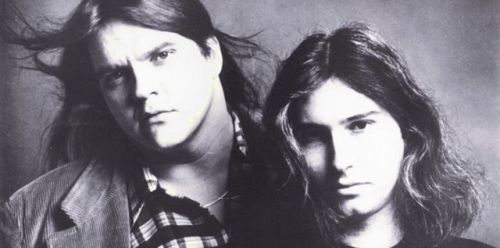
In this month’s feature on artists’ sole successful albums (in the writer’s mind), we tackle on something big and cheesy but ever so brilliant. It’s time to step away gentle indie melancholy and beautiful atmospheres, and hit the rock and roll highway with Meat Loaf.
I love over-the-top music.
This may get a little bit lost among all the talk about how I love subtle details, moody atmospheres and other buzzwords I endlessly repeat but I have 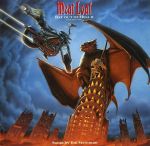 a big thing for music that chucks in every single kitchen sink in a ten mile radius and isn’t afraid to sound GIGANTIC. I love bombast and I love grandeur, and I especially love them when the artist is unashamedly over the top about it. Sure, there’s extremely cheap ways of making things sound big (generic string orchestras, repetetive cymbal crashing) and they can get cringy; however, when you really know what you’re doing, going massive can be sheer artistic brilliance.
a big thing for music that chucks in every single kitchen sink in a ten mile radius and isn’t afraid to sound GIGANTIC. I love bombast and I love grandeur, and I especially love them when the artist is unashamedly over the top about it. Sure, there’s extremely cheap ways of making things sound big (generic string orchestras, repetetive cymbal crashing) and they can get cringy; however, when you really know what you’re doing, going massive can be sheer artistic brilliance.
Jim Steinman is a master of over the top music. He knows how to wield instrumental virtuosos, he knows how to make massive productions sound incredibly detailed and artistic and he’s got a lyrical pen to match it – his lyrics are just as over the top, just as ingenius and just as long as his songs, often blossoming into massive rhyming essays of wild imagery and rock and roll spirit. He is a model example of a person who knows what they’re doing when they’re handling countless instruments together. He is also the man behind “Total Eclipse of the Heart” and as such, deserves a medal for that alone. There is only one problem: he’s not a performer. Steinman isn’t a bad singer, but he’s not a strong one either. He gets lost under his own productions when he tries to front them. It’s one of the reasons why he’s more often been a songwriter for hire rather than a frontman. But while his release history is full of him finding suitably strong vocalists to make his visions come alive, there’s one man that’s always been his greatest companion in this matter. One man with both voice and charisma so large that he’s more than a match to Steinman’s insanely large songs.
That man is Marvin Lee Aday, or Meat Loaf – one of the greatest voices in rock and roll. In saying that, he’s hardly a notable artist in his own right: he’s spent his decades-long career largely defined by his collaborators and an anything-will-do attitude, as long as that anything is big rock songs. The result is a frighteningly patchy mess of a career of a few brilliant moments and hordes of bad imitations and clones of said moments. But give him the right material and his quite frankly stunning voice gets to soar. And if it’s big rock songs he wants to sing, Steinman is the greatest possible match for him – it’s become more or less canon that Aday’s career highlights are the ones where he and Steinman worked together, while time has largely forgotten about the rest. The first Bat Out of Hell album has always received the general accolades but while good, I’ve always found its lacklusters 70s production to not do justice to the songs. The sequel, released a couple of decades later, on the other hand…
Bat Out of Hell II: Back into Hell is both men’s shared masterpiece. It is an album about rock and roll, where electric guitars are gods and misguided youth find purpose and faith in their life through crashing drums and loud sound, and where rock and roll dreams come through. It’s cheesy as all hell, frequently, but it doesn’t care; instead, Steinman just keeps applying one more kitchen sink after another to make his long-winded rock operas even grander and grander. Loaf grabs onto every single one of his words and sings them out like gospel, never letting all the choirs and orchestras and massive rock bands and loud guitars drown his voice out. Every song feels like an Event, something that means more than life itself. If the idealised concept of rock and roll was a religion, these would be its hymns. Each more rocking song is an anthem, each aggressive number a call to arms, each ballad a tearjerking torchsong. Like any song that wants to embody some kind of ideal, the ones here are instantly engaging and each and every one contains at least one, often more, moment so powerful that it makes you marvel at the at the craft behind it.
I have a special place in my heart for Bat Out of Hell II because it’s a breathtaking album, in many ways. Steinman’s incredible knack for a hook and a melody is mixed with excitingly humongous yet lovingly crafted and detail-packed arrangements that are genuinely joyful to dig into and Loaf’s vocals are almost empowering in their sheer strength. It’s also almost nearly an all-killer/no-filler album – the instrumental interlude “Back into Hell” is superfluous and largely pointless and while it’s short, it still contributes to the somewhat fittingly gigantic 70-minute length of the album. On surface it’s an album full of cheesy rock operas but there’s intelligence, passion and soul behind each song. It may be over the top, but it sounds like its creators mean every word from the bottom of their hearts and they pull it off in such a fashion that you too want to become a believer.
Life is a Lemon (And I Want My Money Back)